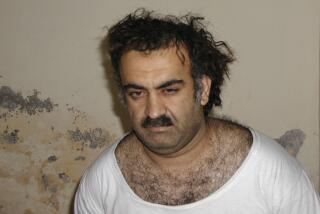CIA psychologist says he threatened to kill 9/11 plotter’s son
- Share via
GUANTANAMO BAY NAVAL BASE, Cuba — A CIA psychologist testified here Monday that he told self-proclaimed Sept. 11 mastermind Khalid Shaikh Mohammed that if there was another attack on America, he would kill Mohammed’s son.
James Mitchell, who designed, oversaw and often carried out the harsh interrogation program in the CIA’s secret black-site prisons, said that in retrospect the threat was probably made in poor judgment but added that “I wanted him to remember it.”
The threat was made in late March 2003, at a secret prison in Poland. Mohammed had been captured three weeks before in Pakistan, before being transferred to Afghanistan and then Poland. The harsh interrogation began within the hour of his arrival on March 7 and lasted until March 25.
Mohammed was deprived of sleep, waterboarded 183 times, slapped, shoved into a wall, placed in stress positions and exposed to continuous bright light and loud noise, all while he was nude.
Waterboarding was the harshest of the techniques, and it was ineffective. “He was a remarkable resister on that,” Mitchell said.
Mitchell said he was trying to ensure that Mohammed continued to cooperate after the harshest interrogation methods had been discontinued.
“If there was a catastrophic attack on the United States and I find out that you had information … and if another child dies, then I will cut your son’s throat.”
Mitchell said that Mohammed had a callous disregard for life. “Look over there,” he said, pointing to Mohammed seated at the defense table. “He’s smirking.”
Two of Mohammed’s sons, then 7 and 9, had been detained in Pakistan in 2002, and are now believed to be living in Iran with their mother.
Mitchell has been unrepentant, and told the military tribunal last week that “I would do it again.”
The interrogations were primarily directed at uncovering planned future attacks. Mohammed had spoken freely about other subjects, but protected whatever information he had on future plots.
“During the harshest period of my interrogation I gave a lot of false information in order to satisfy what I believed the interrogators wished to hear in order to make the ill treatment stop,” Mohammed later told the Red Cross. “I later told interrogators that their methods were stupid and counterproductive.”
The lies, no matter how wild they seemed, had to be investigated.
Mitchell described contentious debates within the CIA over the torture program. He said he favored ending the harshest techniques “when they start talking.” He claims that the interrogations stopped numerous planned attacks, but there is little evidence this is true.
Mohammed and four fellow defendants are charged with conspiring to murder nearly 3,000 people. The pretrial hearings here continue to the end of the week.
David Nevin, a defense lawyer for Mohammed, relied for a large part of his questioning on a Senate Select Committee on Intelligence report and a little-noticed report produced by the CIA’s Office of Medical Services.
The Senate investigation found the interrogation program was brutal and ineffective. The CIA report described the program as well-intentioned, but amateurish and inconsistent. It found it inappropriate that the interrogators authorized to use the waterboard were also responsible for judging its effectiveness.
McDermott is a special correspondent.
More to Read
Sign up for Essential California
The most important California stories and recommendations in your inbox every morning.
You may occasionally receive promotional content from the Los Angeles Times.










